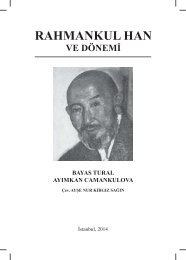THE SOVIET HISTORIOGRAPHY AND THE QUESTION OF KAZAKHSTAN’S HISTORY
SOVYET-TARIH-YAZICILIGI-ENG
SOVYET-TARIH-YAZICILIGI-ENG
Create successful ePaper yourself
Turn your PDF publications into a flip-book with our unique Google optimized e-Paper software.
180<br />
<strong>THE</strong> <strong>SOVIET</strong> <strong>HISTORIOGRAPHY</strong> <strong>AND</strong><br />
The primary task of Soviet historians was to work on essential problems<br />
of the people, the working class, and the peasantry. The most<br />
significant tasks of the Soviet historians were the examination of the<br />
class struggle, revolution and national liberation struggle, and the<br />
investigation of the historical development of the economic structure<br />
based on Marxist ideology. Soviet historians determined the system<br />
as “we” and “others” proceeding from Soviet ideology and keep this<br />
concept alive through its historiography and history books.<br />
To fulfill the duties imposed by the system, Soviet historians needed<br />
an environment for researching. Works would be produced in this<br />
place. The Soviet system provided research centers, institutions, and<br />
universities to create such an environment. But, at the same time, it<br />
controlled the work that the environment produced. It would command<br />
and control the type of product to be developed, which ingredients<br />
will be used and how they will be prepared, the amount of latitude<br />
and how it was presented. Therefore, Soviet historians were never free<br />
or independent in choosing the profession of historian, in determining<br />
the subject of research, in accessing to resources, in reading the<br />
sources, and in approaching the writing and publications. They had<br />
to follow the established rules. In the end, Soviet historians became<br />
the owner of the product, which were fully determined by the rules<br />
of the system. The ones who refused the rules were subjected to punishments.<br />
They have been silenced in the different ways, deported<br />
to Siberia, expelled abroad or were shot.<br />
After the collapse of the Soviet system, Soviet historians and the<br />
environment were also eliminated. However, the product of the system<br />
and its environment, and Soviet historiography, which already<br />
completed its mission, took its place in history.<br />
BIBLIOGRAPHY<br />
Ağayev, Elnur, Sovyet İdeolojisi Çerçevesinde Türk Cumhuriyetlerinin<br />
Tarih Yazımı ve Tarih Eğitimi: Azerbaycan Örneği (History Writing and History<br />
Education of Turkic Republics in the Framework of Soviet Ideology:<br />
Azerbaijan Sample), Hacettepe University Institute of Atatürk’s Principles<br />
and Reforms, Unpublished PhD Dissertation, Ankara 2006.<br />
“Акaдемик РАН И. Д. Ковaльченко (1923-1995). Труды и концепции”,<br />
Отечественнaя история, Moscow, 1996. No. 6, pp. 85-109.<br />
Azerbaycan’da Kabul Edilmiş Akademik Tezlerin Bibliyografyası, (1920-<br />
1975 yılları), [Bibliography of the Accepted Academic Thesises in Azerbaijan<br />
(years between 1920-1975)] 1. Kısım, Elm Neşriyatı, Baku 1981.<br />
Bünyadov, Teymur, “Gözəl İnsan, Böyük Alim”, Tarixvə Onun Problemləri



